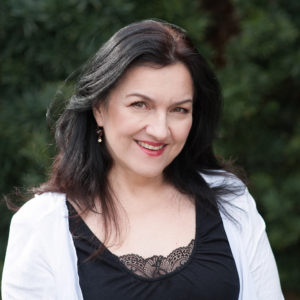What’s In a Name?
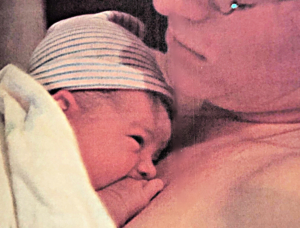
Baby Rodriguez, resting on Mama’s chest
Our first grandchild was born at home, in a warm tub of water that soothed my daughter-in-law so much that she brought forth her first child without any pain medication. As soon as we heard, my husband, Mario, hugged and kissed me. I held his face and whispered, “We’re grandparents! Our lives will never again be the same.”
David–the new baby’s father, my step-son–was eight-years-old when Mario and I got married. We’d always been close, and I thought his wife, Lennae, was a perfect match for him. I knew they would be good parents, but it didn’t stop me from privately questioning their choice of baby-name: Laila Willow. It seemed incongruous with our Latin last name: Rodriguez.
“It doesn’t exactly roll off the tongue, does it?” I joked with Mario. He gave me a sideways smile.
“You better hold your own tongue about that,” he said.
I knew Mario was right. Even a clueless Juliet proclaimed from her balcony, “What’s in a name? That which we call a rose would by any other name smell as sweet….” I knew I’d eventually love the name as much as I loved the idea of our new little person.
David and Lennae live in the Kansas City area; Mario and I, in Northern California. Because of the distance, we had to be satisfied with digital pictures of the birthing experience, so beautiful and otherworldly. There was water, effort, a myriad of expressions, and then: a baby. The infant’s face looked so much like David’s—whose baby pictures were featured in our family photos—that I later sent snapshots for comparison.
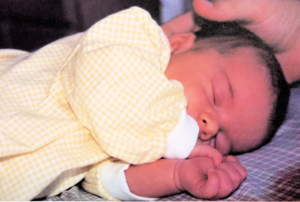
I was unprepared to be a grandparent, especially for longing that instantly overwhelmed me. I wanted to fly to Kansas right away, but the reality of our lives demanded something else. School was starting and I was teaching full time. Our two children still living at home were teenagers with their own hectic schedules. Mario was working non-stop.
Days turned into weeks, and then months. We didn’t really meet our first grandchild until the baby was a year old. The visit was a blur, a time of meeting, observing the beauty and wonder of our first grandchild. Thinking of it still makes me smile. Ambulatory, intelligent, gorgeous, but shy of strangers, the toddling genius made me giddy.
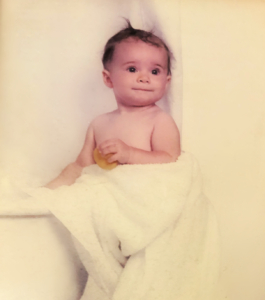
May 2004
One evening, as I excused myself to go to the restroom, I heard, “Grandma,” from the mouth of our most beloved angel. I stopped where I was and looked back. The image of my grandchild, extending a small hand toward me, is something I’ll never forget.
“It’s okay,” David said. “Abuela will be right back.”
Yeah, I thought. I am your Abuela. I’ll always be right back. I’ll always be here for you.
***
We have a total of eleven grandchildren now, through our four children, and I could tell right away I would be a much better grandmother than a parent. As a mother, I felt pressured to raise my children in such a way that they embraced our values and beliefs, made wise choices, and were always happy. I had unrealistic expectations of parenting, and my children. Once I had grandchildren, I forgot expectations, and received only blessings.
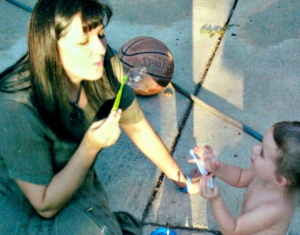
Blowing bubbles during our first visit.
I received a new pair of eyes and a wonder-box of amazement to open. I played house, sang rhyming ditties, danced around to Disney songs. I let them eat multi-colored marshmallows for lunch. I built beaver dams out of sticks, blew bubbles in the backyard, and took them to the park. Watching them learn to read was my privilege. Doing homework with them was a joy. When I was with my grandchildren, I forgot what time it was.
As they grew, I had real conversations with them. I learned their favorite things, listened to what they said, and watched them interact with others. I had never loved so hard with no strings attached, until I had grandchildren. By some incredible miracle, they loved me in the same way.
One day, I had a conversation with my eldest grandchild that I wasn’t expecting. We were driving home from the mall, talking about family. While looking straight ahead, my grandchild told me that he identified as a boy, not a girl. A big brother to his two younger sisters. A son to his parents. My grandson, not my granddaughter. The sun was setting on the Kansas horizon, orange and red against green. My ears started ringing. Behind us, the younger sisters were quiet. I wondered if they had heard all of this before.
I waited for more information. Is my grandchild trying to tell me they identify as transgender? I thought. I wanted to be sure. I looked over to them, sitting at the passenger seat, and my beautiful grandchild looked back at me, green-eyed and perfect. It occured to me that I needed to say something.
“You know… I’ll support you no matter what.” I actually meant this, even though my thoughts were racing madly. Maybe they’ll outgrow this.. After all, they’re a pre-teen. As a mother and teacher, I knew pre-teens changed their minds all the time. But never about gender. I wanted my grandchild to feel acceptance and love from me, no matter what.
I soon realized they would not change their mind. This wasn’t a feeling. It wasn’t a phase. Either I would accept this, or I would live in an alternate reality.
***
My grandson chose a new name for himself: Callen Jasper. Pronouns changed from “she” to “he,” and we started navigating the uncharted waters of transition. Part of me was grieving the loss of my granddaughter, in order to accept my grandson.
My daughter-in-law gave us a copy of Guiding Principles that encouraged and assured us how ongoing learning would be a key element in our family’s process. These principles helped us a lot, but they never explained how to feel. They didn’t prepare us for the emotional roller coaster of joy and sorrow, or the moral journeys we would take, together and separately, to find acceptance. David and Lennae, calm and steady by nature, worked hard to get everyone on the same page and protect Callen against any kind of hatred. He started experiencing shaming and name-calling at school. Something inside of me rose up: Who would be intentionally hateful toward my Grandchild?
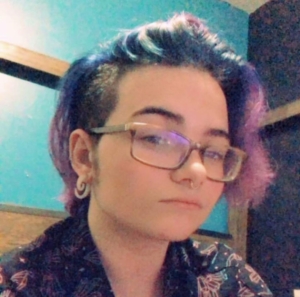
I can’t easily explain everything that happened in our family over the next few years. I prayed for Callen, and our family, constantly. I focused on the things I knew: Callen is my eldest grandchild and I love him in a very deep way. He’s a beautiful force of nature. He is kind to strangers, sensitive and brave, and fiercely protective of his family. He is fun, funny, and creative. Always up for an adventure, despite his battles with anxiety. He’s got a multifaceted heart, always makes room for others, always patient with people who don’t understand.
It was Callen who explained the process of transition to us. A very private matter, we were grateful for this communication. Some parts of it were harder for me to accept than others. Surprisingly, I had a problem with the issue of “the dead name.” I had grown to love the name Laila Willow, and hated losing it. It sank into an invisible ocean, where we could never fish it back out again. I tried to convince myself that this name didn’t matter. That which we call a rose would by any other name smell as sweet. I knew it was the inside that counts. This was still my grandchild. This was a person I loved completely.
What I know now that I didn’t know then is this: names matter a great deal. There’s power in a name. A name identifies us, shapes us, and gives us identity. I used to hate the idea of re-naming. My mother’s family AND Mario had their Latin names Americanized when they entered school. This kind of re-naming decided who they were and what they would be called, because it was the re-namer’s world. But when someone re-names themselves, they decide what everyone else will call them. We are invited to their reality. Calling them by their chosen name acknowledges that we’ve accepted their invitation to know them as they really are.
So, to answer fair Juliet: There is a lot in a name. Plenty.
***
The last time I was in Kansas, right before Christmas, Callen got dressed to go shopping at the mall with me and his sister. When he came downstairs, he was wearing high-heeled leather boots. They looked painful.
“Dude,” I said. “Why are you wearing those cruel shoes? We’re going shopping! Your feet are going to be killing you by the time we’re done!”
He shrugged. “My feet hurt all the time, no matter what.” Callen’s answer referred to his flat feet, issues with his toes, and challenges to find shoes that fit properly.
On the way to the mall, I wondered why Callen would wear high-heels. He had spent the past year physically transitioning, and was a fully realized young man, with the body and fuzzy facial hair to prove it. His feet needed care, and he needed to take care of himself. Why wouldn’t he wear comfortable man shoes?
As if he heard my thoughts, Callen spoke up. “I can’t get caught up in people pleasing,” he said. “I am who I am, and if I want to wear heels, I will.”
His determination was a force to be reckoned with, but as his Abuela, I worried about others hurting him. What if people laughed, or pointed and whispered? I didn’t want this for my grandchild. I wanted the world to be a safe and kind place for him.
Watching Callen and his sister shop, I felt a swell of emotion again. I had to accept, all over again, that I could never make this world accept Callen, let alone respect him. I couldn’t force others to recognize how incredible he is. To acknowledge Callen’s enduring individuality and strength, I had to accept this, too.
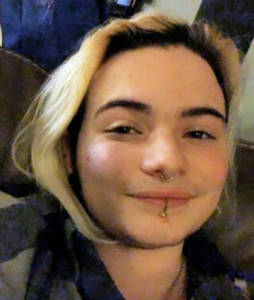
Callen 2020
Callen later texted me about this day. He shared how he felt about his heels, which I thought was important. He told me it was good to share with you: “I know I’m just as much a man as any cis guy. I am a GUY in heels and feel at home with men who are comfortable expressing their feminine side. Men with beards and a fab dress, men with huge muscles but some cute heels. I know people like me won’t fit in anytime soon, but in all this self-discovery, I realize I belong among men like that.”
I know the men Callen is talking about. I go to school with them. We share recovery rooms from time to time. I see them in the supermarket. Like my grandson, they’re taking risks with expressing who they really are. This world doesn’t do well with people who are openly and shamelessly different. I try to smile at these people, hoping I can send a brief message of love their way.
Callen, a Gaelic name, means “powerful in battle.” Jasper is Persian for “treasurer” or “keeper of treasure.” My grandson has been powerful in the battle for his identity, and keeps this treasure. If it weren’t for Callen Jasper, my world would be smaller. He helped me see a different part of myself, a different side of the world. He is the reason I can really listen to others, including those who have similar stories. I’m so glad my heart grew and my world exploded. Only a grandchild can do this to your heart the way Callen did for mine. Love helps us get through so much in this life.
Janet Rodriguez is a proud abuela who also happens to be an author, teacher, editor and Cardinal MFA candidate at AULA. Her words have appeared most recently in Eclectica Magazine, The Rumpus, Cloud Women’s Quarterly, American River Review, and Calaveras Station. Follow her on Twitter @brazenprincess, on Instagram @janetmario, and her personal blog, www.brazenprincess.com.

